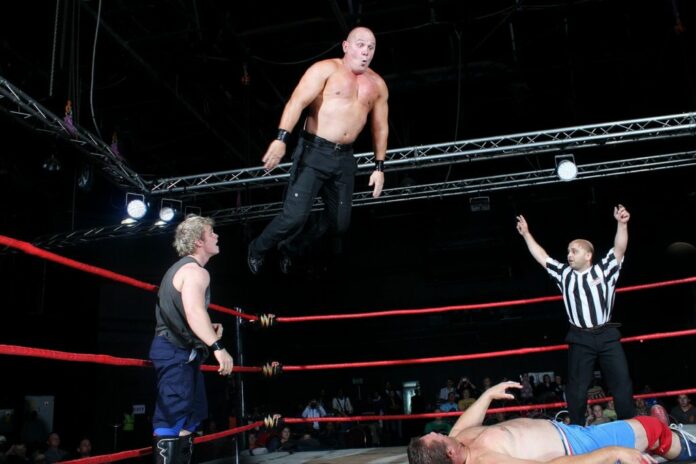
Ever since the UFC launched in the early 1990s, the sport of mixed martial arts (MMA) has exploded in popularity and is now fully a part of mainstream culture. With its blend of fighting styles, it has obviously drawn comparisons with the world’s other major combat sport, boxing.
However, the parallels between MMA and professional wrestling are also worth considering. In fact, intermittent pro wrestlers like Ken Shamrock and Gerard Gordeau performed in some of the first ever UFC shows.
In recent years, we’ve seen legitimate UFC stars like Ronda Rousey and Cain Velasquez cross over into pro wrestling with the WWE (World Wrestling Entertainment), highlighting that there’s clearly shared DNA between the two sports.
Wrestling is indeed one of the foundational martial arts that make MMA what it is today, with former champions like Daniel Cormier coming from a collegiate wrestling background.
MMA and professional wrestling require similar physical attributes. Those involved need to have excellent cardiovascular fitness in order to maintain high levels of energy and endurance for extended periods of time.
They also need physical strength in order to throw their opponents around, which also requires sufficient physical awareness and coordination.
This, however, brings us to the key difference between the two; pro wrestling is scripted, while MMA is not. This means that the outcome and events of a pro wrestling match are pre-determined and rehearsed.
This makes MMA odds more difficult to predict, however that’s not to say that gambling on pro wrestling is pointless. Odds will still be offered for matches and events and it’s not always easy to predict where certain storylines will go.
Both sports come with danger to those competing, but to varying degrees. The moves in wrestling are rehearsed and performed as safely as possible while still looking believable but, as we’ve seen over the years, wrestlers are still putting their bodies on the line for fans’ entertainment. Injuries occur all the time.
In MMA, of course, the punches, kicks, knees and elbows are not fake; they land for real. Fighters will, generally, have to go through a lot more pain than wrestlers – it comes with the territory.
However, wrestlers have a much more demanding schedule. They are regularly on the road, travelling all over the world and performing week-in-week-out. That’s a gruelling career and very physically demanding.
MMA fighters, on the other hand, will only compete a handful of times per year and those at the top of the sport usually only enter the Octagon two or three times a year.
It’s also worth looking at the structure of MMA and wrestling. When most people think of the former, they think of the UFC (Ultimate Fighting Championship) and when they think of the latter, it’s the WWE (formerly known as the WWF, World Wrestling Federation).
The two sports are dominated by a single organisation which attracts the top talent of their respective field. It’s undeniable that the best MMA fighters are picked up by the UFC and that the WWE is the premier platform of pro wrestling.
Clearly, the UFC has picked up a few things from the WWE, most notably how to build drama and storylines between fighters. There’s also an emphasis on those fighters who can cause a stir like pro wrestlers do by cutting impressive promos and dropping one-liners.
Conor McGregor, the biggest star the UFC has ever seen, could walk into the WWE with no guidance required; he’s already the sort of bombastic persona that pro wrestling thrives off.
We’ve also seen pro wrestlers move into MMA, with mixed results. Brock Lesnar is arguably the most successful example, picking up the heavyweight UFC title while simultaneously establishing himself as one of the WWE’s biggest stars.
Jake Hager – formerly known as Jack Swagger in the WWE – has found lower levels of success at Bellator, another major MMA promotional company. CM Punk – real name Phillip Brooks – signed to the UFC off the back of his WWE fame but has since failed to pick up a win inside the Octagon.
Many will argue that pro wrestling is not, in fact, a sport and to an extent they would be right. The WWE, for example, markets itself as a brand of ‘sports entertainment’ instead. This label could also be used for professional MMA as well though; the aim is to entertain fans and entice them to continue watching.
MMA and pro wrestling have plenty of similarities and differences, despite one being scripted and the other purely competitive. The athletes involved need to be in excellent physical condition and are risking their health each time they perform.
We are seeing more and more of these athletes’ crossover between the two, highlighting how many similarities they share. What’s undeniable is that they’re both extremely popular and provide excitement for millions of fans across the world.







